When it comes to washing your hair, there are many different types of shampoos on the market to help you get the job done. From shampoo for dry and damaged hair, curly hair to shampoos for itchy scalps and hair loss, the variety in the beauty industry is truly endless. However, instead of recommending a bunch of random products to you today, we wanted to take this a step further and delve into a complete guide to shampoo shopping instead, picking apart popular shampoos on the market to see what they ultimately do for the health of your hair. From key ingredients to keep an eye out for to damaging ingredients you’ll want to steer clear of, let’s dive into the secrets behind popular shampoos and see which ones you should be using and which you should avoid.
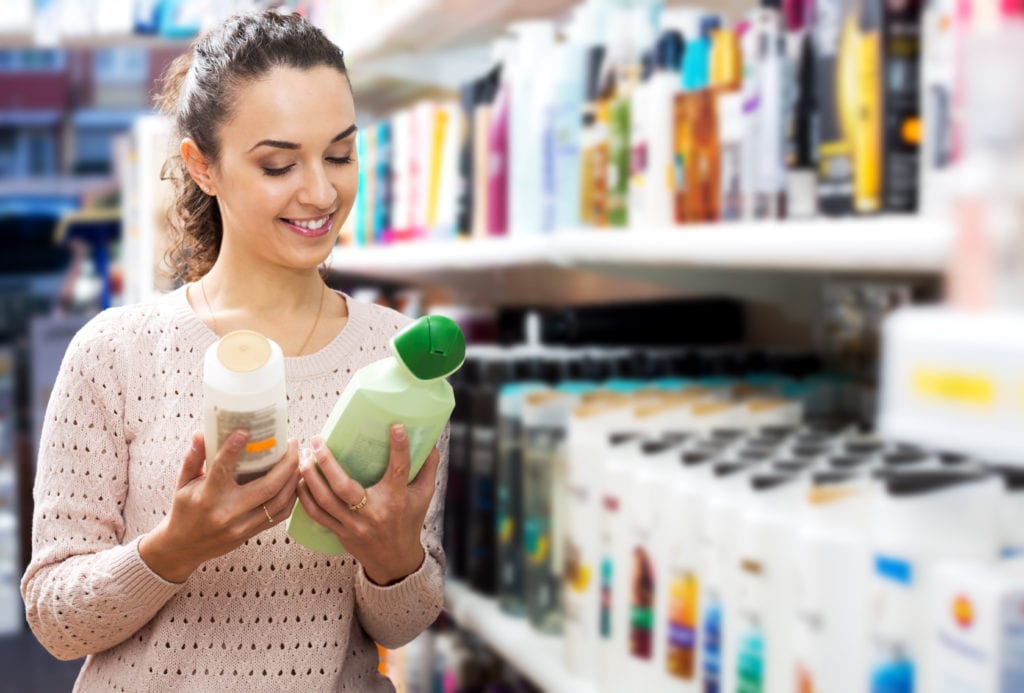
What To Look For When Buying Shampoo
To start off, when it comes to buying shampoo, there are certain ingredients you’ll definitely want to keep an eye out for that are proven to be healthier for your hair and your scalp. For this, you’ll typically want to look for shampoos that contain 95% to 100% organic ingredients such as plant extracts, natural oils, vitamins, keratin, or other proteins. These are all known to strengthen, soothe, protect, and heal your hair, unlike any other. Here are a few examples of ingredients to look for:
- Plant oil extracts such as coconut oil, jojoba oil, avocado oil, almond oil, grape seed oil, etc.
- Herbal extracts and essential oils such as lavender, nettles, sage, peppermint, green tea, rosemary, chamomile, etc.
- Shea butter
- Aloe vera
- Biotin
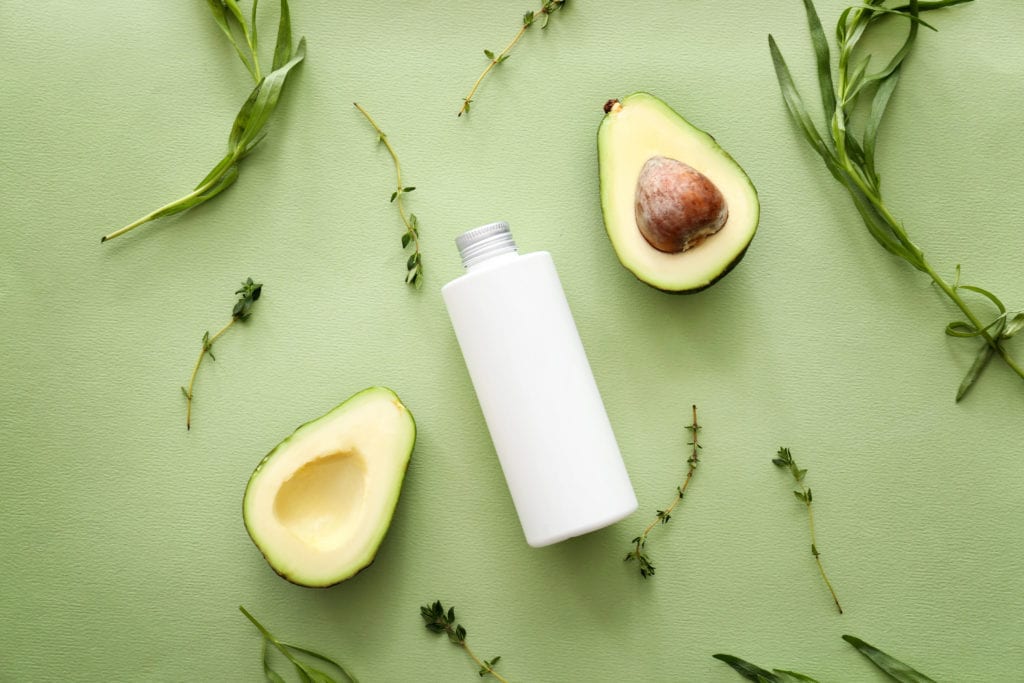
Basically, anything that is more on the natural side is the way to go with haircare products, as they will clean your hair just as well as any other shampoo without the additional damage. You can also read more about other healthy ingredients that are safe to use in shampoos and conditioner in this article here.
Ingredients To Avoid In Shampoo
Next, while there are many natural, healthy, and rejuvenating ingredients in certain shampoos, there’s also a lot of ingredients that you should avoid in others, as not all brands have your hair’s best interest in mind. With that said, we’ve compiled a list of ingredients to steer clear of and a few reasons why you shouldn’t be using them to begin with.
1. Sulfates
The first and most common ingredient you’ll want to avoid in shampoos is sulfates. Sulfates (also known as SLS and SLES) are often used to cleanse away dirt and sebum build-up on the scalp and are most commonly found in dandruff and clarifying shampoos. However, because shampoos with sulfates are designed to be vigorous in cleansing your scalp to remove impurities, they can cause immense damage and breakages to your hair as well. Not to mention, they also strip your hair of its natural oils and fibers, which weaken the strands, resulting in frizziness, dryness, and split ends. Therefore, make sure you read the label thoroughly ahead of time to avoid any future damage.
2. Parabens
Next, another common ingredient to avoid in shampoo is parabens. Parabens are preservatives that are added to hair products to help prevent bacteria from growing in your shampoos. However, parabens are known to mimic the function of the hormone estrogen and are believed to potentially increase the risk of breast cancer.
3. Phthalates
Next, phthalates are another ingredient you’ll want to avoid in your shampoo. Often added to hair care products to increase the spreadability, phthalates are actually believed to have a negative influence on the reproductive and hormonal system and may even be a leading cause in birth defects. Not to mention, amongst many other things, they are also very harmful to the environment and wildlife, and should not be used because of this.
4. Formaldehyde
Next, formaldehyde is another ingredient you’ll want to avoid as it is known to be an irritant for the skin. With that said, formaldehyde can potentially cause pain and irritation in those with sensitive skin because of its carcinogen potentials. Therefore, this is an ingredient that should be avoided at all costs, especially in those with a sensitive or damaged scalp.
5. Triclosan
Next, Triclosan is another ingredient to kick to the curb, as it has been known to cause problems with hair growth. Most commonly found in bar soaps, triclosan is believed to cause a blockage in hair follicles, which can result in unhealthy build-up on the scalp and could potentially lead to hair loss (which is something we definitely want to avoid).
6. Dimethicone
Next, dimethicone is a common silicone added to hair care products. It ultimately acts as a protective layer to your hair shaft but, over time, it tends to build up residue on your scalp and eventually will prevent moisture from entering the hair follicles. Therefore, dimethicone can lead to scalp irritation from clogged pores, which is something you definitely want to avoid.
7. Retinyl palmitate
Next, another ingredient that should be avoided is retinyl palmitate. This is because retinyl palmitate has been known to cause redness, itchiness, and even peeling on the scalp. It is also believed to potentially be a leading cause of reproductive problems and toxicity in organs, and should be steered away from.
8. Alcohol
Next, alcohols used in any form of skincare or haircare are going to be damaging. This is because they are very strong and very dehydrating, and can cause hair to become dry and brittle very quickly. You’ll want to stay away from alcohols such as propanol and isopropyl especially, as these are known to be incredibly harsh.
9. Fragrances
Next, fragrances are yet another ingredient you’ll want to avoid in your shampoo. This is because most fragrances are made of artificial scents, which are typically made from toxic chemicals at their core. Not to mention, fragrances are often a leading cause of irritation and dryness in the scalp and can even cause hair loss. So, if you ask us, a little extra scent just isn’t worth the risk.
10. Colors
And lastly, any added colors to shampoo are a definite no-go. The ingredients that go into making synthetic colors for hair products are often derived from coal tar or petroleum, which is something you definitely don’t want near your body. These are often listed on labels as ‘’FD&C’ and or D&C’, so make sure you keep an eye out. You can also read more about the negative effects of this and other harmful ingredients to avoid in shampoos here.
Now that we’ve gone over what ingredients you should look for and what you should avoid, let’s pick apart each kind of shampoo for a more accurate view of what they are, what they do, and which one is best for your personal needs.
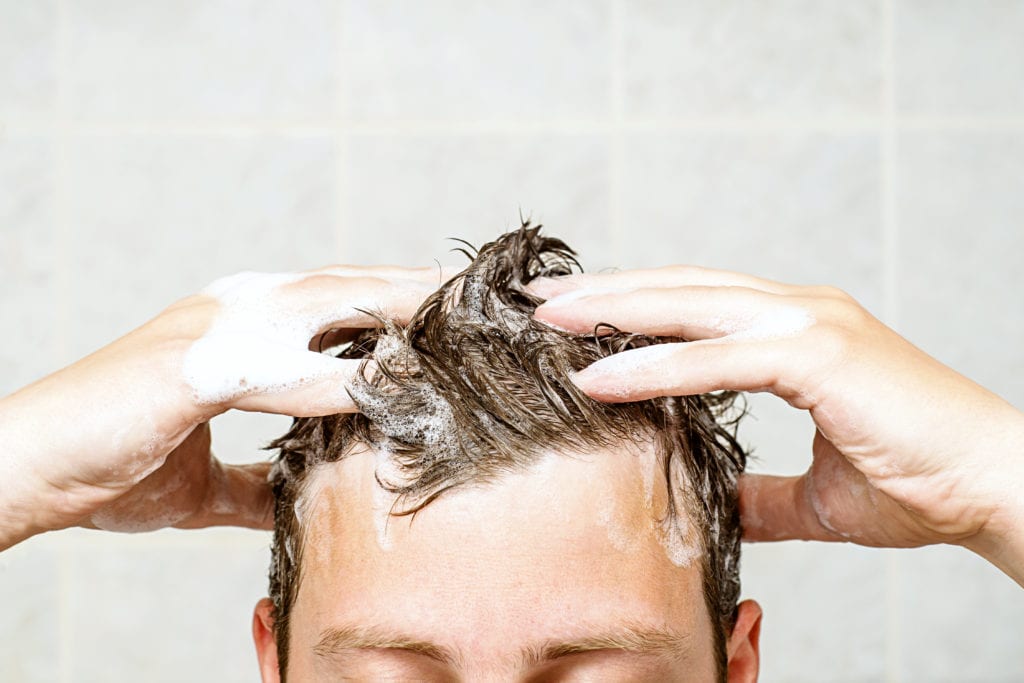
Shampoo For Dry Hair
What It Is
The first shampoo we wanted to delve into is for dry hair. Dry hair happens for many reasons, whether it’s from bleaching your hair, using harsh products, or just a lack of proper moisturizing; sometimes, it is unavoidable and may even be caused by genetics. With that said, shampoos for dry hair have ultimately been designed to help tackle brittle hair that is lacking proper hydration and supply it with moisturizing ingredients to bring it back to health.
How It Works
The way this works is that shampoos for dry hair have been designed to help enhance hair that is lackluster by boosting natural ingredients to bring life, shine, and radiance back to your hair. These are typically used to help increase hydration in your hair follicles for a healthy, sleek, and soft appearance.
Recommendation
Our recommendation for this would be shampoo with naturally hydrating ingredients, such as coconut oil, honey, avocado oil, or aloe vera, as these help to absorb into the hair for a deep conditioning treatment. You may also want to keep your eyes peeled for shampoos that have a natural bond-builder in them, as this can also help to rejuvenate dry hair as well.
Shampoo For Oily Hair And Scalp
What It Is
Next, oily hair and oily scalp are typically caused by overactive sebaceous glands on the scalp that produce excess oil. This oil buildup catches dirt, produces dandruff, and makes your hair clump together and feel weighed down. However, this can also happen as a result of product buildup. Therefore, shampoo for oily hair and scalp is designed to help balance out oil, reduce an excess of it, and restore your hair back to a healthy state.
How It Works
The way this works is that shampoos for oily hair and scalp help to get rid of excess oil and buildup with each rich lather. These shampoos will penetrate deep to remove buildup and debris that weigh down the hair and ultimately leave it with a healthier appearance.
Recommendation
Our recommendation for tackling this problem would be shampoo with active ingredients zinc PCA, or kaolin, as these are known to help diminish oil and grease for a lighter, softer, and healthy appearance while also working to protect the hair from further damage.
Shampoo For Itchy Scalp
What It Is
Next, shampoos for itchy scalps are designed to reduce irritation and bring the scalp back to a natural and healthy state. Itchiness on the scalp can occur for many reasons; however, dandruff is one of the most common causes of it, which can result from dry skin, lack of proper hygiene, product buildup, or even seborrheic dermatitis.
How It Works
The way shampoo for itchy scalps works is by temporarily soothing the scalp while working to prevent itchiness with a variety of gentle ingredients. If the problem is from dandruff, shampoos for itchy scalp can help to penetrate deep into your scalp and remove debris that may be causing you discomfort.
Recommendation
Now, because an itchy scalp can take some time to get rid of, you’re going to want to find a shampoo with strong ingredients that can remove stubborn debris while also making sure you’re keeping it as natural as possible to preserve the health of your scalp. Therefore, keep your eyes peeled for peppermint or tea tree in the ingredients list of shampoos. You may also want to try a zinc pyrithione shampoo, as this has been shown to help dandruff and ease intense itchy in many cases. However, some itchy scalps do require medical attention. Therefore, if your scalp has sores, swelling, or pained itching, make sure you contact your doctor before doing anything else.
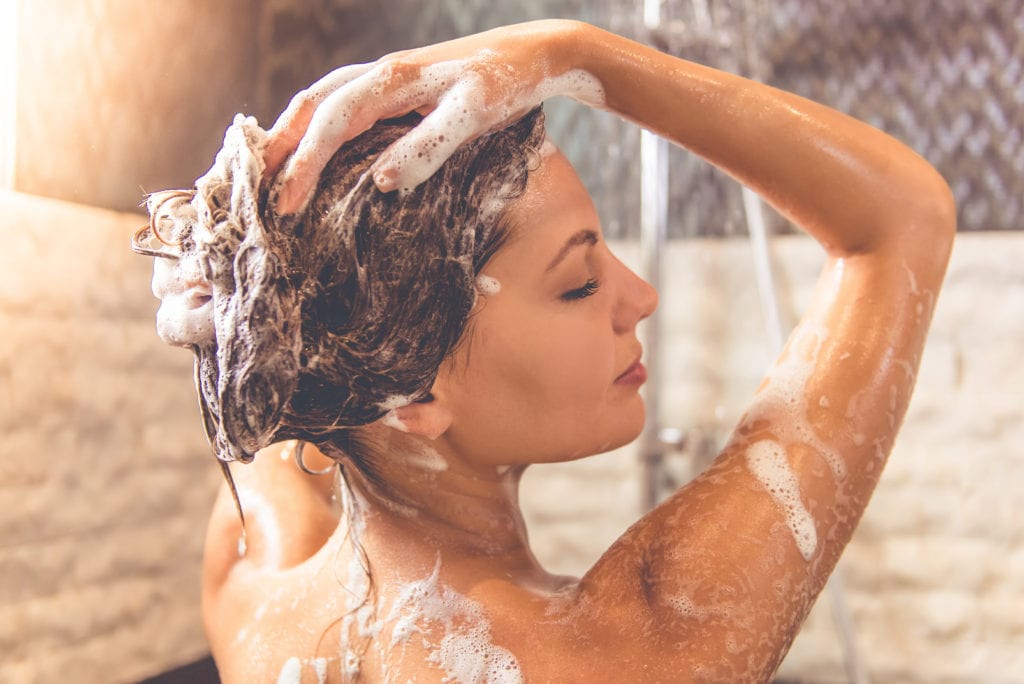
Shampoo For Damaged Hair
What It Is
Our next shampoo is for damaged hair. This type of shampoo is often made with gentle and natural ingredients to help mend broken, frayed, and fried hair. Now, damaged hair can come from a variety of things. From coloring your hair to using heat styling products, whatever its source, damage can cause the hair to break, fall out, and even feel like straw. However, shampoos specifically designed to attack this problem will help to give life back to your hair, returning moisture and repairing breakage unlike any other.
How It Works
The way this works is by deeply conditioning your hair with natural ingredients to avoid further damage. This is often done through keratin treatments that help to repair damaged proteins in your hair to strengthen the shaft and follicles for stronger and healthier locks.
Recommendation
Our recommendation for this is to look for products that contain antioxidants, keratin, proteins, ceramides, lipids, and healing oils. You’ll also want to take it easy on any heat styling or coloring of your hair that you may be doing to help speed up the healing process. It may take some trial and error to figure out what works for you, but it will be worth it if you keep it consistent.
Shampoo For Thinning And Balding Hair
What It Is
The next shampoo on the list is made for fine, thinning and balding hair. Shampoos designed for these kinds of problems can be used to help promote hair growth as well as soothe the scalp from any discomfort that goes along with hair loss.
How It Works
The way this works is that these shampoos contain active ingredients, such as castor oil, that promote the regrowth of hair. When massaged lightly into the scalp, it can help to stimulate the scalp for new growth.
Recommendation
Now, of course, there is no shampoo that can fully reverse the effects of balding and thinning, but there are shampoos that can help it to be less noticeable and even help to promote new hair growth. Our recommendation for this would be a shampoo with castor oil or aloe vera, as these are both soothing and can unblock clogged follicles from excess buildup to allow for new hair growth. Coconut oil can also help to supply the hair shaft with fatty acids to help reduce loss of proteins in thinning hair, making it less likely to break off.
Hair Thickening Shampoo
What It Is
Next, hair thickening shampoo isn’t just for men (we have a guide for that), it is meant to eliminate gaps in the hair by thickening hair strands for an enhanced look. However, contrary to popular belief, thickening shampoo isn’t designed to treat hair loss, as it doesn’t promote new hair growth. Instead, it just fluffs out the hair you already have for a fuller appearance.
How It Works
Now, the way this works is that thickening shampoo helps to fortify proteins in the outer layer of hair strands, supplying them with a deep penetration of moisture. This moisture helps hair follicles to swell, creating a temporary fuller look.
Recommendation
For our recommendation, when it comes to thickening shampoos, you’ll want to keep an eye out for biotin (vitamin B7), hydrolyzed keratin, and zinc in the ingredients list, as these are gentle and will help your hair to look thicker, healthier, and more voluptuous in a very short period of time.
Clarifying Shampoo
What It Is
Next, clarifying shampoo is considered to be one of the most powerful, if not the most powerful, shampoo for removing buildup in your hair.
How It Works
The way this works is that clarifying shampoo almost acts as a magnet to dirt, oils, and grime, attracting them and removing them more thoroughly than any other shampoo. This helps to boost your hair’s manageability and gives a more sleek and softer appearance to the hair.
Recommendation
Our recommendation for this is to keep it as gentle as possible. Most clarifying shampoos contain a high level of sulfates to remove stubborn buildup, which can be very harsh on your hair. For that reason, you may want to opt for a clarifying shampoo for sensitive scalp or even colored hair, as these are typically more gentle than a regular clarifying shampoo. We also recommend not using it more than once or twice a month, as too much clarifying can strip away your scalp’s protective layer and natural oils, leaving it feeling dry and irritated.
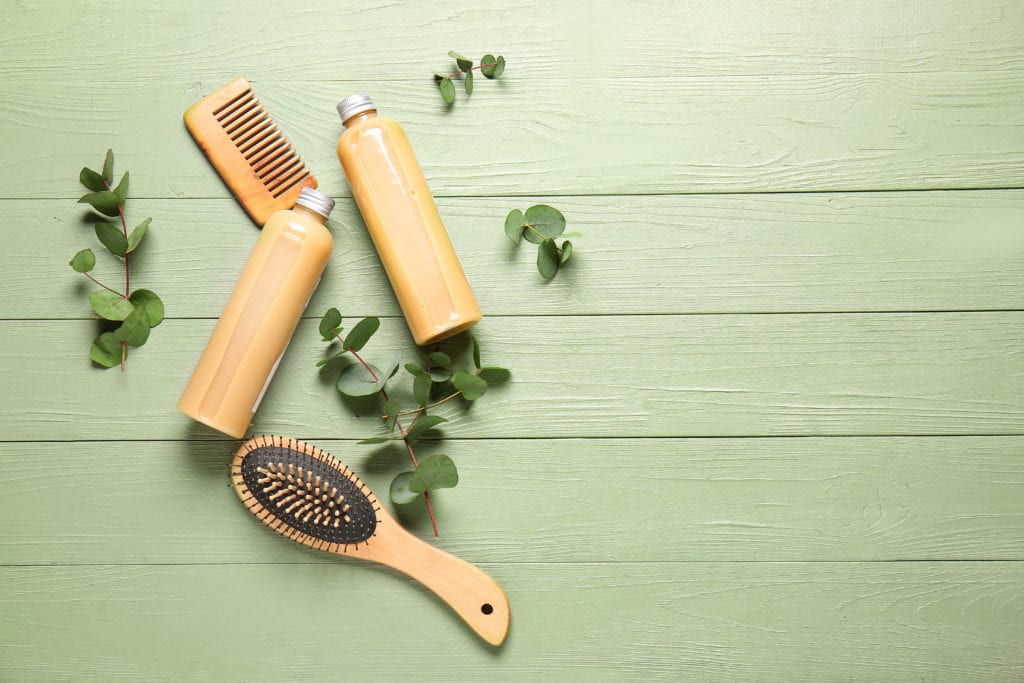
Fragrance-Free Shampoo
What It Is
And lastly, fragrance-free shampoo is just as it sounds: it is shampoo made without a fragrance. These shampoos are carefully designed without any harmful or artificial fragrances to help prevent damage, irritation, and flakiness. These are also most commonly used by those who have sensitive scalps but can be used by anyone looking for a healthier hair care routine.
How It Works
The way fragrance-free shampoo works is by removing any and all fragrances to prevent chances of allergic reactions, dryness, and irritation on the skin. As we mentioned early, most shampoos with fragrances are made from artificial scents and harsh chemicals, which don’t do any good for your hair. Therefore, these fragrance-free shampoos are gentle on the hair, scalp, and skin and provide a soothing, more natural treatment than any other.
Recommendation
Our recommendation for this would be anything that says “fragrance-free” and “all-natural,” as these are likely to be the most gentle and soothing shampoos on the market. However, make sure you read the ingredients list carefully on “all-natural” products to ensure there aren’t any artificial fragrances hidden in there before you buy.
Conclusion
In conclusion, there are many unique shampoos out there. From fragrance-free to hair-thickening, the variety on the market is truly endless. However, we hope that this guide has given you a little more insight into what shampoo may be the best option for you to keep your hair happy, healthy, and thriving like no other.
Sources:
https://nutrafol.com/blog/15-shampoo-ingredients-to-avoid/
https://www.genesiscareer.edu/8-ingredients-to-avoid-in-your-shampoo-and-conditioner/
https://www.healthline.com/health/shampoo-ingredients-for-different-hair-needs
https://www.everydayhealth.com/news/the-13-ingredients-to-look-for-in-your-products/


